The Meaning of Thought

Реклама. ООО «ЛитРес», ИНН: 7719571260.
Оглавление
Markus Gabriel. The Meaning of Thought
CONTENTS
Guide
Pages
Dedication
The Meaning of Thought
Acknowledgements
Notes
Preface
Notes
Introduction
Notes
1The Truth about Thought. Complexity without end
What is thinking?
Humans are not the only thinkers
The scope of the universe
Aristotle’s senses
Common sense made sensible
The meaning of ‘sense’, or: the many ways of being wrong
The loneliness of cosmic exile
Not all objects are things
Are there (really) any red bottle caps?
Thinking is not an irritation of the nervous system
Nothing but the truth
The world as a wish list
Frege’s thoughts
Information and fake news
Our sixth sense
Notes
2Thought Engineering. The map and the territory
Can computers speak Chinese?
Photos don’t remember Crete
An ant is crawling on a patch of sand, and why this has nothing to do with Winston Churchill
The god of the internet
Civilization and its discontents
Emotional intelligence and hidden values in the digital labyrinth
A religion called ‘functionalism’
Thought is not a vending machine …
… and the soul is not a pile of beer cans
Pacemakers for the brain?
The idea of technology, or: how do I build a house?
Total mobilization
Society is not a video game
The Achilles heel of functionalism
Notes
3The Digital Transformation of Society. It’s perfectly logical, isn’t it?
Some set-theoretical ping-pong
Everything crashes eventually
Do computers really know anything?
Heidegger’s murmurings
One miracle too many
In the age of ‘complete orderability’
Trapped in The Circle?
A fleeting visit to Winden – society as nuclear power plant
One consciousness to go, please!
Who has a problem here?
Notes
4Why Only Animals Think. The nooscope
On souls and index card boxes
‘And now come, thou well-worn broom’
Illuminated brains
Consciousness first – Tononi meets Husserl
Inside, outside or nowhere
A slimy and intricate piece of reality
Notes
5Reality and Simulation
Mental cinema meets smartphone
The unavoidable Matrix
In memoriam: Jean Baudrillard
Horror and hunger (games)
Beautiful new world – welcome toThe Sims
Are you awake or trapped in your dreams?
Do you know Holland?
Matter and ignorance
What is reality?
A hybrid reality
Fish, fish, fish
The shimmering spectrum of reality
Caesar’s hairs, India’s manhole covers and Germany
Frege’s elegant theory of facts
On the limits of our knowledge
Do thoughts lurk within the skull?
The difference between cauliflower, cognac and the thought of thought
Human AI
The end of humanity – tragedy or comedy?
Notes
The End of the Book – a Pathos-Laden Final Remark
Glossary. A
B
C
D
E
F
G
H
I
K
L
M
N
O
P
Q
R
S
T
U
V
W
Index. A
B
C
D
E
F
G
H
I
J
K
L
M
N
O
P
Q
R
S
T
U
V
W
X
Y
Z
POLITY END USER LICENSE AGREEMENT
Отрывок из книги
For Leona Maya
Translated by Alex Englander and Markus Gabriel
.....
The second anthropological principle says that the human is a free, specifically minded animal (freies geistiges Lebewesen). This means that we humans can change ourselves by changing our image of what it means to be human. The specific freedom of the human mind lies in how our human life form is self-determining. We define our being human, and on the basis of our self-definitions we discover the moral values around which to orient our actions. Other animals have only a dim understanding of morality, and they certainly do not participate of their own accord in the enlightenment project of moral progress. There is absolutely no gender equality in most animal societies, and there is not even a hint of the notion that they should cooperate in order to help foster other species. Cooperation in the animal kingdom is typically a matter of symbiosis and not of rule-governed moral thought designed to enhance the living conditions of everyone. Lions do not consider becoming vegetarians, and we do not blame them for their culinary preferences, because we know that they lack a sufficiently explicit grasp of the standing possibility of moral insight and perfectibility.
This is not to say that humans always act as their values dictate, or even that there is a high probability that they will. Freedom means precisely being able to act in this way or that way – morally or immorally. Yet our freedom also means that we cannot do anything at all without regulating and directing our behaviour. In modernity, therefore, the ultimate horizon of our self-determination, the highest value, is given through our conception of the human. We no longer seek the highest value beyond the human being, in a divine sphere, but we look within ourselves. This does not mean that we are steered around by the voice of conscience; rather, it means that we can steer and control ourselves, by recognizing that we are all united in being human. In this way, modernity is oriented around humanity as the bearer of reason and, if it is to be consistent, naturally has to recognize the value of non-human life too. Enlightened humanism therefore also demands the recognition of animal rights and the careful cultivation of the environment, to sustain the conditions of human and animal life quite generally on our planet.
.....